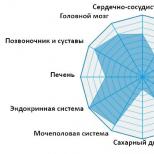Independent military medical commission. XXVIII. Registration of conclusions of military medical commissions
"Passage medical examination»
Military medical commission(hereinafter - VVK) FKUZ "MSCh of the Ministry of Internal Affairs of Russia for the Moscow Region" (hereinafter - MSCh) is located at the address: 127299, Moscow, st. Novaya Ipatovka, 3. Nearest metro station: Voykovskaya metro station – 2.4 km. From the metro: minibus No. 78 to the stop " Clinical hospital Moscow City Internal Affairs Directorate", trolleybus No. 57 to the stop "Priorova Street, CITO Institute". Or railway platform: Krasny Baltiets (Riga direction) 800 m on foot.
VVK operating hours:
Monday Friday;
For initial requests: 09:00 – 13:00, 13:45 – 18:00;
For secondary requests: 11:00 – 13:00, 13:45 – 18:00.
Phones, code (499):
Registration: 159-52-28;
Head of VVK:159-51-13;
Lieutenant colonel internal service Zolotukhin Nikolay Nikolaevich;
Deputy Head of the Military Military Commission: 150-04-42;
Lieutenant Colonel of the Internal Service Marina Georgievna Prokopenkova;
Major of the Internal Service Pavel Viktorovich Dokshin;
Secretariat: 159-52-28.
Citizens upon entering service in the territorial body of internal affairs Russian Federation;
Employees for service in the territorial body of internal affairs of the Russian Federation;
Employees and citizens entering educational institutions of the Ministry of Internal Affairs of Russia;
Employees at the time of their dismissal from the internal affairs bodies of the Russian Federation;
Persons undergoing military service (service) and other citizens in the interests of other federal bodies executive power of the Russian Federation on the basis of agreements concluded by the Ministry of Internal Affairs of Russia with the relevant authorities.
VVK also:
Ensures the issuance of conclusions on the severity of injury received by employees in order to receive insurance amounts under compulsory state insurance;
Provides determination of the causal relationship of injuries (wounds, injuries, concussions), diseases among employees and persons who served in internal affairs bodies, as well as causation mutilations (wounds, injuries, concussions), diseases leading to the death of these persons.
Scroll necessary documents for passing the Military Medical Examination (based on the order of the Ministry of Internal Affairs of Russia dated July 14, 2010 No. 523 “On approval of the Instructions on the procedure for conducting military medical examination and medical examination in the internal affairs bodies of the Russian Federation and internal troops Ministry of Internal Affairs of the Russian Federation").
For citizens entering the service it is necessary to provide:
A referral for a medical examination issued by the head of the territorial body of internal affairs of the Russian Federation, certified by the official seal;
Clinical blood test (study of hemoglobin level, number of red blood cells, reticulocytes, erythrocyte sedimentation phenomenon, number and composition of leukocytes) (clause 143.1);
General urine analysis (determining the concentration of hydrogen ions of urine (urine pH), specific gravity (relative density) of urine, protein in urine, glucose level in urine and examination of urine sediment) (clause 143.1);
Blood test for the presence of human immunodeficiency virus (HIV) (clause 143.2);
Blood test for syphilis (RW) (clause 143.2);
Blood test for markers viral hepatitis B and C (HBsAg and HCV) (clause 143.2);
Electrocardiogram at rest and with exercise (performed on day 1) and its description (clause 143.1);
Outpatient medical records (medical records) (extracts from them) for at least the last 5 years (clauses 141.2 – 141.3);
Extract from the card preventive vaccinations(clause 141.3);
Fluorographic (x-ray) examination of organs chest in 2 projections (clause 143.1);
Certificates from tuberculosis, dermatovenerological, psychiatric and drug addiction dispensaries at the place of registration for the last 5 years, certified by the seals of the relevant dispensaries (clause 141.1);
For citizens who served under a contract in the Ministry of Internal Affairs of Russia, the internal troops of the Ministry of Internal Affairs of Russia, the Ministry of Defense of the Russian Federation, the FSB of Russia and other departments, it is necessary to additionally provide (clause 17.10, clause 108, clause 109):
Outpatient card from the departmental clinic (extract from it) for the last 5 years;
A copy of the dismissal order;
Copies of VVK certificates from your personal file;
Military ID of a reserve officer of the Armed Forces of the Russian Federation.
For persons over 40 years of age, it is necessary to provide (clause 117):
Intraocular pressure measurement results;
Blood glucose test results;
Biochemical blood test for total cholesterol and triglycerides.
For employees and citizens entering educational institutions of the Ministry of Internal Affairs of Russia, it is necessary to additionally provide:
X-ray of the paranasal sinuses and its description (item 160).
In addition, citizens entering police colleges and Suvorov medical schools must be provided with a stool test for helminth eggs and giardiasis (clause 160).
A mandatory event before conscription is a military medical commission. Young people over 17 years of age and conscripts undergo a military medical commission. This commission is carried out at the place of registration young man in district and city military commissariats. The purpose of the military medical commission is to obtain information about the health status of the conscript and assign him the appropriate fitness category. In this article we will talk about what the IHC is and what citizens undergo through the IHC commission.
What is VVK in the army?
In essence, the IHC is a medical commission to determine the health status of a conscript. However, it has some differences from a regular medical commission. All young people who are over 17 years old, conscripts, as well as boys and girls who want to serve under a contract, undergo military military training.
The legislation of the Russian Federation has the following definition of IHC:
“The Military Medical Commission (MMC) is a special body of the military medical service, intended to determine the suitability of citizens for military service through a full medical examination."
The result of the IHC commission is to assign the citizen a category of fitness in military service. There are five such categories, they include:
- Category A – assigned to completely healthy conscripts, suitability for service without restrictions;
- Category B – fit with some restrictions (usually restrictions on the type of military service);
- Category B – limited suitability;
- Category D – temporarily unfit, it can be assigned due to the presence of certain diseases in a citizen that are subject to treatment, after which a re-examination occurs in 6-12 months;
- Category D – completely unfit, such a citizen is exempt from service forever.
If a conscript does not agree with the conclusion of the IHC and considers it to be untrue, then he has every right to appeal it to a higher city or central commission. If the conscript can prove his fitness (or unfitness) for military service, the decision will be canceled.
The following categories of citizens are required to pass the IHC:
- Young people of pre-conscription age before initial registration;
- Conscripts for military service;
- Citizens who want to serve under a contract;
- Minors who enter cadet educational institutions;
- Applicants to military universities;
- Students entering the military department;
- Soldiers and officers in service;
- Family members of military personnel.
The referral to the IHC is issued by the institution to which the citizen is attached - the university, military unit, military registration and enlistment office, etc.
VVK specialists and duration of passage
We figured out what VVK is in the army, no less interest Ask for conscripts, this is what they undergo at the All-Russian Military Commission commission.
The IHC Commission has a clear list of specialists required for passing, these include:
- Therapist;
- Oculist;
- Neuropathologist;
- Surgeon;
- Dentist;
- Otolaryngologist;
- Expert in narcology.
These are the main specialists; if necessary (special conditions of service), other specialists can be appointed. It is worth remembering that conscripts have the right to receive complete information about diseases that may cause distress during their service. Also. conscripts can undergo an independent military medical commission.
In terms of time, the IVC can be completed in 1 day; in some cases, if a more thorough examination of a citizen is necessary, the commission may take two to three weeks.
The military medical commission is a rather serious undertaking that requires time and responsibility from the conscript. It is on the basis of the IHC that a decision is made whether a given citizen is capable of serving in Russian army.
It is no secret that only those persons of military age who are in good health and meet special requirements can enter the Armed Forces of the Russian Federation. That is why in mandatory recruits are selected. For this purpose, the Military Medical Commission is created - a military medical commission, which includes only experienced specialists. She conducts a comprehensive examination not only of young people who are required to enroll in military service, but also of applicants for a variety of positions in the army and the Ministry of Internal Affairs.
This system has its own hierarchy. Its highest body is the Central IHC, to which commissions in the districts are subordinate. They, in turn, exercise control over the activities of doctors in garrisons, military registration and enlistment offices and military hospitals.
What tasks is military medical examination designed to solve?
The main task of the Military Military Commission is to staff the armed forces of the Russian Federation with citizens of the country, health indicators and physical form which corresponds established by law requirements. To successfully cope with its decision, the commission uses the following methods:
- development of criteria by which conscripts, contract servicemen, and officers are divided into several categories based on health status;
- Preparation special techniques conducting a medical examination;
- regular examinations that make it possible to identify conscripts fit for military service, as well as determine the degree of health of existing military personnel;
- monitoring the treatment of officers, contract soldiers and conscripts in medical units and military hospitals.
According to the results medical examinations The Military Military Commission also distributes military personnel among military branches and units in such a way as to ensure the maintenance of the combat effectiveness of the troops. The most appropriate and rational methods for such distribution are developed by the commission.
Other functions that the IHC is called upon to perform include:
- examination, based on the results of which it is determined whether a citizen is fit for service in the ranks of the Russian army, for training in specialized educational institutions having a military department;
- conducting medical examinations for exemption from service or referral to hospital treatment for health;
- identifying the causes of injuries to military personnel, as well as injuries and serious illnesses for persons participating in military training;
- control over the work of medical institutions in military units, as well as district and garrison military hospitals;
- conducting medical examinations of military personnel who are retiring from the Armed Forces of the Russian Federation.
What conclusions can a military medical commission issue?
The duties of the military medical commission include examination of both soldiers and sergeants conscript service, as well as officers and generals. For both, it can produce the following conclusions:
- full (absolute) fitness, which gives the right to serve in any units, regardless of the type of troops;
- suitability for non-combatant service. In this case, the conscript may be sent to storage bases for weapons and equipment in other military units, which operate exclusively in peacetime;
- suitability for military operations with restrictions of the 1st or 2nd degree. In the second case, the conscript cannot be sent to the army in peacetime;
- unfitness for military service, which entails deregistration;
- the need to go on vacation to restore health.
Functions performed by district and Central IHCs
The district military military commission, which controls all commissions of units and hospitals located in the district, not only conducts medical examinations to determine suitability for military service. In addition, it carries out:
- treatment of military personnel after injury, wounds, or the occurrence of any diseases, carried out in special military medical institutions;
- diagnosis of diseases;
- development and implementation preventive measures;
- control of doctors who conduct medical examinations.
Central IHC, which is supreme body system, manages all commissions under its control, and is also involved in organizational activities, development and approval of regulations on conducting examinations and preventive measures, and resolving any controversial issues.
Composition of the IHC: number and specialization of doctors
According to current legislation, the military medical commission must consist of at least three doctors. However, in the overwhelming majority of cases, conscripts undergo examination by much more specialists:
- ophthalmologist (or optometrist);
- otolaryngologist (ENT doctor);
- neurologist;
- surgeon and traumatologist;
- dentist;
- psychiatrist and narcologist.
The final conclusion based on the results of the medical examination and test results is given by the general practitioner. It is possible for other specialists to participate in the IVC, which significantly increases the accuracy of the examination.
Types of military medical commissions
Depending on the goals and objectives, the commission can be:
- non-standard, created only if necessary on the basis of any medical institution(city clinic or hospital, for example);
- regular Such military military commissions are formed on the basis of military institutions that constantly require the services of doctors;
- hospital This commission is created if necessary and is subordinate to the regular IHC;
- temporary, created only to provide assistance during medical examinations large quantity conscripts or schoolchildren (students) receiving a registration certificate.
Each of these bodies employs experienced specialists. Their selection is carried out according to the following criteria:
- availability of an academic degree or higher medical education;
- clinical work experience;
- having extensive experience.
All doctors who are members of the VVK undergo special courses that focus not on performing any direct duties, but on assessing the state of health and level of physical development. That is why such a commission necessarily identifies conscripts who are not fit for military service.
Is it necessary to pass the IVC when applying for a job in the Ministry of Internal Affairs?
As we mentioned earlier, the military medical commission conducts a medical examination of persons wishing to get a job in the police. Today their number has increased significantly, since in the Ministry of Internal Affairs you can count on good and, importantly, stable wages, a wide range of benefits, as well as a full social package.
Health requirements for applicants to the police depend on the position the candidate will occupy. But in the vast majority of cases, it is excellent physical shape that is important criterion for personnel selection.
How to successfully pass the IHC when applying for a job in the internal affairs bodies? To do this, it is enough to meet the following requirements:
- have good health, which will allow you to exclude conclusions about unsuitability from one or more specialists;
- be resistant to various kinds psychological stress;
- be physically strong and resilient.
The procedure for passing medical examinations for employment in the Ministry of Internal Affairs
Unlike conscripts, candidates for work in the Ministry of Internal Affairs immediately undergo a military medical examination in district commissions. At the same time, the requirements for its results differ for boys and girls. For example, the first person must obtain a conclusion on absolute fitness for military service. Representatives of the fair half of humanity can do without such a mark, but the commission must still make a positive verdict on hiring.
To conclude this article, let’s say that passing the VVK- is far from the only problem that everyone who wants to get a job in the Ministry of Internal Affairs will face. In addition to this, a number of other quite complex tests are provided for them.
IN Lately the number of people wishing to work in the Ministry of Internal Affairs (MVD) has increased. This trend is associated with obtaining a constant stable high wages, which ranges from 35,000 to 55,000 rubles, with benefits and full social benefits. package, quarterly bonuses, which provides guarantees for a good future. In addition, the uniform and officer position have their own privileges in society. Everything would be fine, but the employment process itself is complex and time-consuming. This is due to the passage of a medical commission, psycho- physiological diagnostics(PDF), studying legal acts and federal laws, as well as their further submission to the regional leadership.
They begin to get a job by passing a military medical commission (MMC). Here are instructions on how to pass the IVC at the Ministry of Internal Affairs. The most important conditions are good health, stress resistance and endurance. First you need to undergo medical examination. examination at the regional, and then at the educational military medical commission. Young men must receive a certificate of registration with the mark “fit for service” or “A”. Girls do not need this certificate. Examining candidates for work in the Ministry of Internal Affairs the following doctors: dentist, surgeon, neurologist, psychiatrist, therapist. Girls visit a gynecologist without fail. You also need to pass general tests and undergo an ECG. There are a number of requirements for how to enter the Ministry of Internal Affairs. Firstly, persons wishing to work in the Ministry of Internal Affairs must be between the ages of 18 and 35, regardless of gender, race, nationality, or financial status. Secondly, they must have a legal education. And thirdly, individuals must be capable, in their personal and business qualities, physical training and health status to perform their assigned duties.
It is worth finding out in advance how to get a job at the Ministry of Internal Affairs, since this process is very lengthy and can even take several years due to the large number of checks. In the personnel department, an application for employment is filled out, which is signed by the head of the city, the head of the service and the head of the department itself. A table with information about close relatives is also filled out. An autobiography is being written. It is necessary to provide a description of the place of residence from the district police officer. Bring two written recommendations from employees who work or have worked in the Ministry of Internal Affairs. Various certificates from doctors are collected. Passes PE and PPD. And you definitely need to undergo medical examination. commission.
You should also know how to enter the Academy of the Ministry of Internal Affairs, because it can be the first step towards employment in the Ministry of Internal Affairs. The academy admits applicants aged 17–25 years. They must comply with all physical, psychological and medical indicators. Filed with the applicant’s personal file is the conclusion of the Higher Inspectorate, a certificate stating that he is fit to enter the academy and a medical card. examinations. In many educational institutions The cadets are in barracks condition. This helps not only to develop physically, but also strengthens character, instills in them high moral qualities, which are sometimes so lacking in the modern world.





